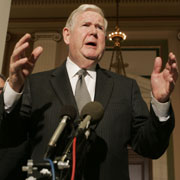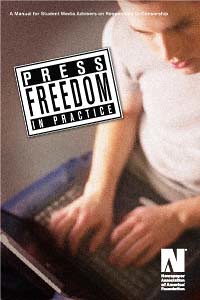Herbert Says Bush is Just A Broken Record
I was thinking the same thing as Bob Herbert this morning. Every time we see the President lately, he's telling us how much safer from terrorists we are by fighting in Iraq. I guess we should thank ourselves for getting rid of all those WMDs, too, huh?
December 1, 2005
Op-Ed Columnist
Bush Hits Rewind
By BOB HERBERT
It's weird. It's like watching a computerized model of a president. Somebody programs George W. Bush, carefully embedding the information to be dispensed over the next several hours, and then he goes out and addresses the nation - as a computerized bundle of administration talking points.
"We will never back down," said Mr. Bush in his speech at the U.S. Naval Academy yesterday. "We will never give in. And we will never accept anything less than complete victory."
I don't think there were many people who believed him. Members of Mr. Bush's own party are nervously eyeing next year's Congressional elections. They would abandon Iraq in a heartbeat if it meant the difference between getting re-elected or having to hunt for a real job.
This war (which has already cost the lives of more than 2,100 Americans and tens of thousands of Iraqis) was cynically launched (it was never about Sept. 11) and incompetently fought (we have never sent enough troops or sufficient equipment), and will be brought to a close by people obsessed not with the security of the United States and the welfare of the troops, but with the political calendar.
"I will settle for nothing less than complete victory," said Mr. Bush. He then dutifully defined victory as follows:
"Victory will come when the terrorists and Saddamists can no longer threaten Iraq's democracy, when the Iraqi security forces can provide for the safety of their own citizens, and when Iraq is not a safe haven for terrorists to plot new attacks on our nation."
Those were some of yesterday's talking points. Here's today's reality: the $6-billion-a-month U.S. military mission in Iraq is unsustainable, as is the political support for the war. There is now a virtual consensus that a significant American troop withdrawal will get under way in 2006.
Meanwhile, the Iraqi security forces are ill equipped, understaffed and widely infiltrated by private militia members and insurgents. In many ways, it's an amateurish operation.
As Senator Jack Reed, a Rhode Island Democrat who served in the 82nd Airborne, told reporters this week:
"Without an effective ministry that can keep track of soldiers and police, pay those soldiers and police, apply those soldiers and police and essentially provide the foundation, then you're going to have some tactically trained units, but they're not going to be a coherent or effective force."
Despite the rosy scenarios offered by President Bush, American-style democracy is nowhere in sight in Iraq. Among other things, the evidence of horrific human rights abuses by Iraqi forces allied with us - including kidnappings, torture and murders - is increasing.
In short, the picture in Iraq is not a pretty one, and there is no indication that substantial improvements are coming soon.
If the president gets any of this, you couldn't tell it by his appearance yesterday. He stuck to his talking points. "To all who wear the uniform," he said, "I make you this pledge: America will not run in the face of car bombers and assassins so long as I am your commander in chief."
We may not cut and run in Iraq, but with the G.O.P. sweating out next year's elections, the plans are already under way for American forces by the tens of thousands to cut and speed-walk toward the exits. Mr. Bush could have been honest about this yesterday, but he chose not to be.
If the administration does not address this inevitable pullout, or pullback, seriously, it will be conducted as incompetently as the post-invasion operation.
The inevitable drawdown of U.S. forces is hardly a secret. In addition to the political pressures coming from the G.O.P., there's the fact that we don't have enough people in the military - and can't entice enough people into the military - to back up the president's blithe promises.
Senator Joseph Biden, a Delaware Democrat, said in an op-ed article in The Washington Post that it was likely that 50,000 troops would be redeployed out of Iraq by the end of next year and "a significant number" of the remainder in 2007.
A president who's little more than a bundle of talking points cannot possibly maintain the long-term trust and confidence of the public. There's a disturbing remoteness to President Bush that seems especially odd in a politician who was selected by his party because of his supposed ability to project warmth and the kind of fundamental authenticity that his Democratic opponents lacked.



























